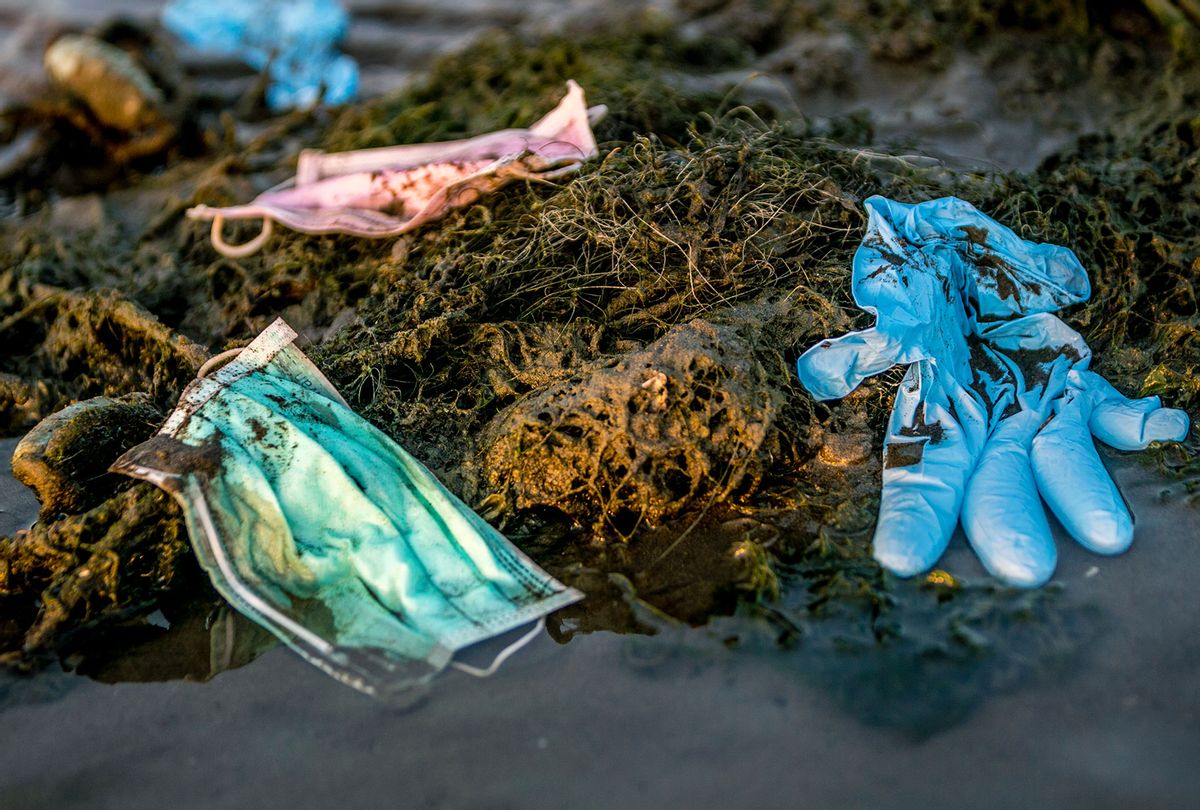Soiled light-blue face masks, muddy, broken or flittering in the bushes, are a ubiquitous sight in the pandemic-era urban landscape. Indeed, of the billions of personal protective equipment objects manufactured to keep the world's population safe, much of said trash ultimately migrates into our oceans, or in some cases other bodies of water.
According to a report released on Tuesday by the nonprofit environmental advocacy group Ocean Conservancy, their network of International Coastal Cleanup (ICC) partners and volunteers found more than 107,000 pieces of PPE (personal protective equipment) polluting the planet's beaches and waterways in the second half of 2020. This included not only face masks but also face shields, gloves and sanitizing wipes. Among the volunteers surveyed by the nonprofit, 94% saw PPE pollution at a cleanup; more than 80% said that face masks were the most common form of PPE pollution that they discovered; and 37% reported that they found PPE actually submerged within various bodies of water.
Ocean Conservancy also noted in its report that, because of COVID-19 era limitations in how partners and volunteers could effectively collect data, the 107,000 pieces recorded is almost certainly a significant undercount. Given that plastic pollution was already a significant problem before the pandemic, this raises serious questions about how the increased use of PPE has worsened the crisis.
"We know there is evidence of face masks' elastic straps entangling animals," Nick Mallos, senior director of Ocean Conservancy's Trash Free Seas program, told Salon. "We know again that microplastics in the environment are taken up by animals — small and large, including fish and shellfish — for human consumption. So many of the mechanisms of impact and risk associated with PPE are the same ones that we have seen from every day plastics that have been littering in our beaches and waterways for decades."
Want more science stories in your inbox? Subscribe to Salon's weekly newsletter The Vulgar Scientist.
Allison Schutes, director of Ocean Conservancy's International Coastal Cleanup, said the PPE issue is magnifying the problem of plastic pollution, which she noted is "already a significant crisis" when it comes to plastic pollution.
"We know that a lot of these single use plastics are always on our Top 10 list," when it comes to International Coastal Cleanup, Schutes explained. "These are the items that are found year after year. In 2019 alone over 5 million food wrappers were found and collected and documented, over 2 million plastic beverage bottles, and over 1 million straws."
The deluge of PPE pollution, and the fact that individuals and governments have done very little to address it even as we confront other ramifications of the pandemic, could have far-reaching consequences.
"It's really something that we all individually are going to have a role to play, but it's also important and imperative for our companies and our governments to take a strong role in helping us really mitigate and solve this crisis," Schutes told Salon.
Overall, the COVID-19 pandemic has a mixed effect on Earth's ecology, and in some cases it has been arguably beneficial: For instance, many climatologists believe there was a roughly 7% decrease in greenhouse gas emissions in 2020 compared to 2019 because people traveled less due to pandemic restrictions. At the same time, the scourge of plastic pollution poses just as much of a threat to the future of the human species as does climate change. There is mounting evidence that chemicals found in many plastics are linked to infertility (particularly plummeting sperm counts) and birth defects.
Despite this, plastic pollution continues to worsen, with an Australian study last year finding plastic in 100 percent of five different types of seafood.
While it remains to be seen what can be done about this problem overall, Ocean Conservancy does have some advice about how individuals can more responsible dispose of their PPE.
"In terms of PPE, we can all make sure we have properly snipped those elastic bands [on our masks] when you're done," Mallos told Salon, alluding to how animals can get entangled in them. "For restaurants, make sure you're reducing the amount of plastics you're serving right now during the pandemic when delivery and takeout is at its highest." He also urged governments to enact legislation like the Break Free From Plastic Pollution Act of 2021, which aims to heavily regulate and ultimately phase out dangerous plastics. "We really need action from the individual all the way up to global policy," Mallos added.



Shares